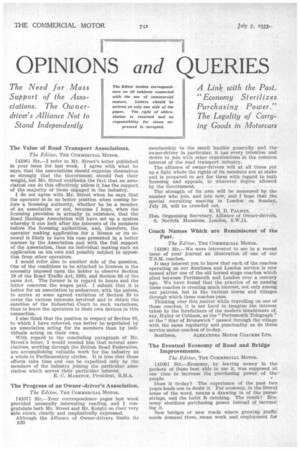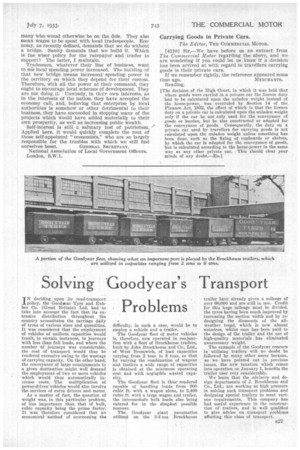OPINIONS and QUERIES The Value of Road 'Transport Associations.
Page 44

Page 45

If you've noticed an error in this article please click here to report it so we can fix it.
The Editor, TEE COMMERCIAL MOTOR.
[41061 Sir,—I refer to Mr. Street's letter published in your issue for last week. I agree with what he says, that the associations should organize themselves so strongly that the Government should feel their weight, but Mr. Street overlooks the fact that no as.soelation can do this effectively unless it has the support of the majority of those engaged in the industry. I do not agree with Mr. Street when he says that the operator is in no better position when coming before a licensing authority, whether he be a member of an association or not, because I hope, when the licensing provision is actually in existence, that the Road Haulage Association will have set up a system whereby it can look after the interests of its members before the licensing authorities, and, therefore, the operator making application for a licence or its renewal is likely to have his case presented in a better manner by the Association and with the full support of the Association, than an individual making such an application on his own and possibly subject to opposition from other operators.
I would refer also to another side of the question. One of the conditions to be attached to licences is the necessity imposed upon the holder to observe Section 19 of the Road Traffic Act, 1930, and Section 93 of the game Act. The former is in regard to hours and the latter concerns the wages paid. I submit that it is better for an association to endeavour; with the unions, to arrive at some agreed variation of Section 19 to cover the various interests involved and to obtain the sanction of the Industrial Court to such variations, than to leave the operators to their own devices in this connection.
I also think that the position in respect of Section 93, to which I have referred, can better be negotiated by an association acting for its members than by individuals acting on their own. With regard to the concluding paragraph of Mr. Street's letter, I would remind him that several associations, working through the British Road Federation, are accomplishing valuable work for the industry as a whole in Parliamentary circles. It is true that these efforts take time and can be expedited only by the members of the industry joining the particular association which serves their particular interest. E. C. MAEFrox, President, R.H.A.
The Progress of an Owner-driver's Association.
The Editor, THE COMMERCIAL MOTOR.
[41071 Sir,—Your correspondence pages last week provided unusually interesting reading, and I congratulate both Mr. Street and Mr. Knight on their very able views, clearly and emphatically expressed. Although the Alliance of Owner-drivers limits its B26 membership to the small haulier generally and the owner-driver in particular, it has every intention and desire to join with other organizations in the common interest of the road transport industry. The alliance of owner-drivers will at all times put up a fight where the rights of its members are at stake and is prepared to get for them with rega,rd to both licensing and. appeals, to whatever degree allowed by the Government. — . . The strength of its arm will be measured by the number who join, and join now, and I hope that the special recruiting Meeting in London . on Sunday, July 16, will be crowded out.
Hon. Organizing Secretary', Alliance of Owner -drivers. 6, Norfolk Mansions, ,London, S.W.11.
Coach Names Which are Reminiscent of the Past.
The Editor, TEE COMMERCIAL MOTOR.
f4108l Sir,—We were interested to see in a recent issue of your journal an illustration of one of our T.S.M. coaches.
It may interest you to know that each of the coaches • operating on our Southsea and London service is now named after one of the old horsed stage coaches which plied between Portsmouth and London over a century ago.. We have found that the practice of so naming these coaches is creating much interest, not only among our patrons, but in the various towns and villages through which these coaches pass. Thinking over this matter while travelling on one of these coaches, it is not hard to imagine the interest taken by the forefathers of the modern inhabitants of, say, Ripley or Cobham, as the " Portsmouth Telegraph 7 or the " Star of Brunswick" passed through the village with the same regularity and punctuality as do these service motor coaches of to-day.
Southsea. ALEXANDRA MOTOR COACHES LTD.
The Eventual Economy of Road and Bridge Improvements. • The Editor, THE COMMERCIAL MOTOR.
[41091 Sir,—Economy, by leaving money in the pockets of those best able to use it, was supposed at one time to increase the purchasing power .of the people.
Does it to-clay? The experience of the past two years leads one to doubt it. For economy, in the literal; sense of the word, means a drawing in of the 'ors& strings, and the habit is catching. The result? Eeonomy sterilizes purchasing power instead of increas.z ing it. New bridges or new roads where growing ,traffi.c needs demand them, .mean work and employment for many who would otherwise be on the dole. They also mean wages to be spent with local tradespeople. Economy, as recently defined, demands that we do without a bridge. .Sanity demands that we build it. Which is the wiser policy for the ratepayer and trader to support? The latter, I maintain.
Tradesmen, whatever their line of business, want to see local spending power increased. The building of that new bridge means increased spending power in the territory on which they depend for their custom. Therefore, with all the power at their command, they ought to encourage local schemes of development. They are not doing it. Unwisely, in their own interests, as in the interests of the nation, they have accepted the economy call, and, believing that enterprise by local authorities is somehow or other detrimental to their business, they have succeeded in stopping many of the projects which would have added materially to their own prosperity, as well as increasing public wealth.
Self-interest is still a salutary test of patriotism. Applied here, it would quickly complete the rout of those self-appointed "economists," Who are so largely responsible for the troubles with which we still find
ourselves beset. GENERAL SECRETARY, National Association of Local Government Officers. London, SAVA. Carrying Goods in Private Cars.
The Editor, THE COMMERCIAL MOTOR.
. [4110] Sir,—We have before us an extract from The Commercial Motor regarding the above, and we are wondering if you could let us know if a decision has been arrived at with regard to travellers carrying goods in their private cars.
If we remember rightly, the reference appeared some time ago. MERCHANTS. Beading.
[The decision of the High Court, in which it was held that where goods were carried in a private car the licence duty had to be calculated upon the unladen weight instead of the horse-power, was overruled by Section 14 of the Finance Act, 1932, the effect of which is that the licence duty on a private car is calculated upon the unladen weight only if the car be not only used for the conveyance of goods or burden, but be also constructed or adapted for the conveyance of goods. Consequently, the duty on a private ear used by travellers for carrying goods is not calculated upon the unladen weight unless something has been done, such as the fixing of cupboards or shelves, by which the car is adapted for the conveyance of goods, but is calculated according to the horse-power in the same way as any other private ear. This should clear your minds of any doubt.—En.]




































































































